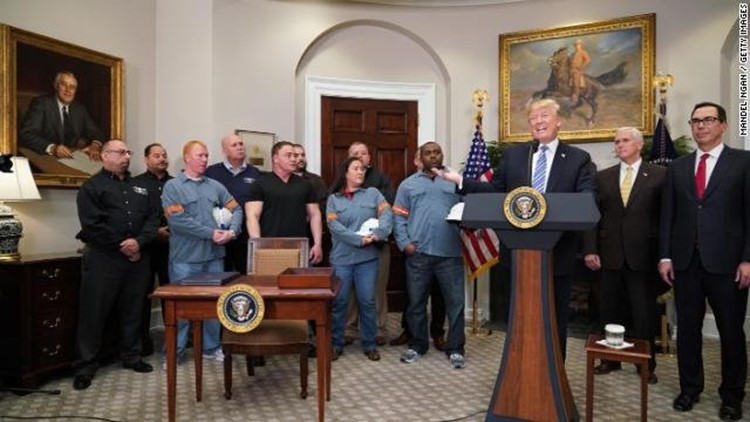WASHINGTON — President Trump is imposing steep tariffs on steel and aluminum from three of America’s biggest trading partners — Canada, Mexico and the European Union.
The trade penalties, 25% on imported steel and 10% on imported aluminum, take effect at midnight, Commerce Secretary Wilbur Ross told reporters Thursday.
The announcement immediately raised the risk of retaliatory tariffs against American products.
Trump announced worldwide steel and aluminum tariffs in March but granted exemptions to some major trading partners.
Canada, Mexico and the EU were among the countries granted relief while the United States pursued negotiations to address the administration’s concerns about the state of domestic steel and aluminum production. Those negotiations had a Friday deadline.
Trump’s decision could raise prices for Americans on a range of everyday products. It could also place the United States in a trade dispute on more than one front. The administration is separately moving ahead with tariffs on Chinese goods.
Trump imposed the steel and aluminum penalties under a 1962 law that gives the president broad power to increase or reduce tariffs on goods deemed critical to national security.
“We take the view that without a strong economy, you cannot have strong national security,” Ross told reporters.
Trump’s announcement lifted American steel and aluminum stocks because those companies stand to benefit from penalties against their foreign competitors. U.S. Steel climbed 3%. But the broader market sank because of trade war fears. The Dow fell about 200 points.
Europe had promised swift retaliation if it was hit with the trade penalties, and had warned it could quickly respond with 25% tariffs on US products such as motorcycles, denim, cigarettes, cranberry juice and peanut butter.
Getting rid of the exemptions for Canada and Mexico, meanwhile, could complicate ongoing negotiations on NAFTA. Canada had also pledged to retaliate.
“Should restrictions be imposed on Canadian steel and aluminum products, Canada will take responsive measures to defend its trade interests and workers,” Canadian Foreign Minister Chrystia Freeland said in March.
The NAFTA talks were one factor in the administration’s decision to grant exemptions to Canada and Mexico from the steel and aluminum tariffs. But Ross said Thursday that those talks “are taking longer than we hoped.”
Canada was the largest exporter of steel to the United States by value last year, according to data from Wood Mackenzie. Mexico was the third largest, behind South Korea.
The Trump administration said Tuesday that it is moving forward with tariffs on $50 billion worth of Chinese goods as punishment for intellectual property theft.
The Chinese government said the announcement was “obviously in violation of the consensus reached in Washington recently by both China and the United States.” Both parties had previously said that tariffs would be put on hold as talks continued.
Ross is scheduled to go to China this weekend for a third round of negotiations.
The United States is also exploring the possibility of putting new tariffs on cars. Last week, The Trump administration announced an investigation into whether automobile imports are hurting US national security, laying the groundwork for another trade fight.
Such an action could hurt Mexico, Canada, Germany and Japan.
What it means for you
You could be affected even if your business has nothing to do with rolls of aluminum or slabs of steel.
First, the price of some products that everyone buys will probably go up.
Both metals are crucial raw material for autos, airplanes and appliances made in the United States. The construction, oil and utility industries use them for beams, pipelines and wires, as well as cans for food and drinks.
It’s not clear how much imports will fall if Trump follows through with the tariffs. Experts say it’s not clear that the existing American industry can supply all the steel and aluminumnow imported from abroad, since restarting closed factories will be difficult, expensive and could take years in some cases.
That means that manufacturers might have to keep importing these materials and pay the tariffs. That will raise their costs, making their products less profitable, or if they raise their prices, less competitive.
Even if an American manufacturer buys from domestic steel mills or aluminum smelters, those companies could hike their prices since they won’t have to worry about as much competition from low-priced imports.
Beyond that, the trade dispute with these major partners isn’t likely to stop with these products.
Mexico and the EU have already pledged to retaliate against American products with their own tariffs.
For example when the steel and aluminum tariffs were first announced in March, Europe signaled it was prepared to take action aimed at Harley-Davidson motorbikes, bourbon whiskey and Levi’s jeans in retaliation. Farmers could also be hit by tariffs imposed on food exports.
Tariffs will probably also hurt the value of your 401(k), since a trade war is typically bad news for American stocks. The Dow was down more than 200 points midday Thursda



